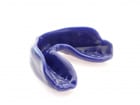 If you have a troublesome broken tooth, you don’t need to worry. With our amazing restorative treatments we can patch you up and have you fighting fit again in no time.
If you have a troublesome broken tooth, you don’t need to worry. With our amazing restorative treatments we can patch you up and have you fighting fit again in no time.
Treating a broken tooth
There are many possible causes of a broken tooth, including sports injuries, falls, accidents and biting down on hard foods or other objects. Sometimes it’s obvious that a tooth is damaged, but in other cases the signs may be more subtle and a dental X-ray will be used to confirm a fracture.
If you have a broken tooth, there are various options open to you including a filling for a minor chip, an inlay or onlay for more extensive damage or a crown for a severe fracture. Your dentist will carry out an X-ray to ascertain the degree of damage and then talk to you about your options once they have the results. At this point, your dentist will explain what the different treatments are, how they work and you can ask as many questions as you like. If the tooth is damaged it’s a good idea to repair it quickly to reduce the risk of any further damage going forward.
Preventing dental damage
Sometimes, accidents are inevitable. However, there are often steps that can be taken to minimise the risk of an injury, including:
- wearing a mouthguard if you play sport
- maintaining good oral hygiene
- seeing your dentist for regular check-ups
- avoiding using the teeth to bite down on hard objects, such as trying to remove bottle tops
- always wearing a seatbelt
- taking care on slippery surfaces and wearing suitable footwear
Signs of a broken tooth
Possible symptoms of a broken tooth include sudden dental pain, heightened sensitivity and a feeling of weakness in the tooth, which may become more intensive if you try to use the tooth, for example to chew.
If you need attention for dental damage, we are here to help! Call us today to book your appointment and banish pain for good.










 Teeth can be damaged in many ways. Chips, cracks and breaks can occur as the result of sporting injury, motor vehicle accidents or from any other kind of head trauma. Broken teeth can be very painful and also expose the sensitive inside parts of the tooth to the risk of infection and disease. Teeth can also be damaged by dental decay and enamel erosion. This again leaves them vulnerable to attack from disease, which could eventually lead to tooth loss. When teeth are damaged in this way it is necessary to protect them from further injury and also to restore the cosmetic appearance.
Teeth can be damaged in many ways. Chips, cracks and breaks can occur as the result of sporting injury, motor vehicle accidents or from any other kind of head trauma. Broken teeth can be very painful and also expose the sensitive inside parts of the tooth to the risk of infection and disease. Teeth can also be damaged by dental decay and enamel erosion. This again leaves them vulnerable to attack from disease, which could eventually lead to tooth loss. When teeth are damaged in this way it is necessary to protect them from further injury and also to restore the cosmetic appearance. For teeth that are cracked and broken beyond repair the solution might be to have a dental crown. This may sound like a serious procedure but it is really quite straightforward and could save you a lot of pain and discomfort.
For teeth that are cracked and broken beyond repair the solution might be to have a dental crown. This may sound like a serious procedure but it is really quite straightforward and could save you a lot of pain and discomfort. If you have ever suffered from a knocked out, chipped or cracked tooth you will know exactly how painful it can be. Not only is the pain immediate, but it may require months or even years of painful and costly dental surgery to repair the damage. Knocked out teeth cannot always be replaced and you may require a dental implant or bridge to artificially replace it. Chipped and cracked teeth can usually be repaired with dental bonding, but if the structural damage is too severe, it may require a crown or a veneer to prevent any further damage. All of these artificial dental substitutes will require replacing at various intervals throughout your life.
If you have ever suffered from a knocked out, chipped or cracked tooth you will know exactly how painful it can be. Not only is the pain immediate, but it may require months or even years of painful and costly dental surgery to repair the damage. Knocked out teeth cannot always be replaced and you may require a dental implant or bridge to artificially replace it. Chipped and cracked teeth can usually be repaired with dental bonding, but if the structural damage is too severe, it may require a crown or a veneer to prevent any further damage. All of these artificial dental substitutes will require replacing at various intervals throughout your life. Until the advent of composite resin fillings, or white fillings as they are more commonly known, patients had little choice but to have unseemly amalgam fillings. These amalgam fillings, invented in France in the early 1800s, had been widely used around the world to fill dental cavities. Made form an alloy of silver and mercury, these amalgam fillings, while very strong, were very noticeable in the mouth. They also expanded over time causing further damage to teeth and were notoriously difficult to fit, with dentists often having to inflict unnecessary damage on teeth to fix them. More concerning is the controversy that surrounds amalgam fillings with regards poisonous and dangerous mercury vapours that are released into the body when placed and during eating. Although this has never been resolutely confirmed it is enough of a concern to many patients to want to have them replaced.
Until the advent of composite resin fillings, or white fillings as they are more commonly known, patients had little choice but to have unseemly amalgam fillings. These amalgam fillings, invented in France in the early 1800s, had been widely used around the world to fill dental cavities. Made form an alloy of silver and mercury, these amalgam fillings, while very strong, were very noticeable in the mouth. They also expanded over time causing further damage to teeth and were notoriously difficult to fit, with dentists often having to inflict unnecessary damage on teeth to fix them. More concerning is the controversy that surrounds amalgam fillings with regards poisonous and dangerous mercury vapours that are released into the body when placed and during eating. Although this has never been resolutely confirmed it is enough of a concern to many patients to want to have them replaced.

